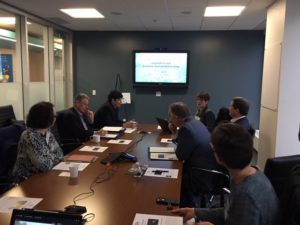
On February 15, 2018, the Washington State China Relations Council convened the first Policy Briefing Series of the year with a presentation from Susan Whiting, Associate Professor of Political Science and Adjunct Associate professor of International Studies and the School of Law at the University of Washington. Spencer Cohen, Senior Economist at Community Attributes Inc., acted as discussant, contributing thoughts and discussion questions on the intricacies of the relationship between land reform and the growth of China’s economy.
Dr. Whiting’s extensive research on “administrative land transactions” has revealed remarkable insights into this cornerstone of China’s planned economy. Since the mid-1990s, the “fiscalization of land” has been a primary means through which local and county governments have secured extrabudgetary funds to fill fiscal gaps, act as debt collateral, and meet the demands of the central government. The supplemental revenue achieved through the seizure and sale of land “almost rivals the formal budget,” Whiting explained.
While there remains within China a very strong political ability to take land, Whiting noted that the process of reallocation has been accompanied by significant unrest and has contributed to a widened urban-rural divide. Whiting’s research also questions whether, in consideration of the limited quantity of arable land in China, the widespread repurposing of agricultural land for industrial purposes is an efficient model for land use.
Dr. Cohen contributed thoughts on current Chinese administrations land reform agenda and the sustainability of this model to drive economic growth at the local level.
Summary Author: Trudy Boothman